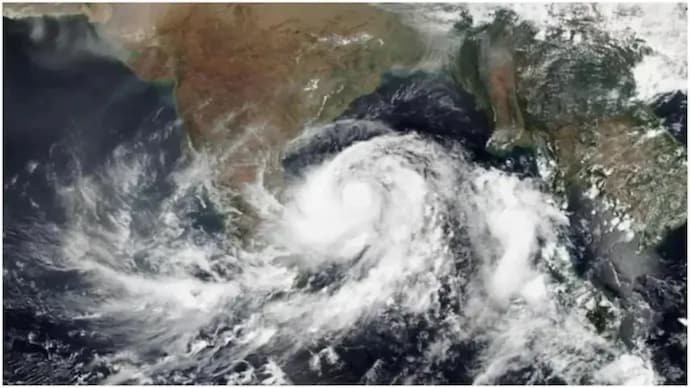


Severe cyclone Remal made landfall over coastal areas of Bangladesh and adjoining West Bengal on Sunday night, according to the Indian Meteorological Department (IMD). The landfall process is expected to last for 4 hours, with a maximum wind speed of 110-120 kmph. Prime Minister Narendra Modi held a review meeting and was briefed about the measures taken, while Governor CV Aananda Bose set up a task force to deal with any uncertainties. 800,000 people have been evacuated in Bangladesh and heavy rainfall and high tidal surges are expected in certain coastal districts.
Cyclone Remal: A Fury Unfolding over Bangladesh and West Bengal
On Sunday night, Cyclone Remal unleashed its fury upon the coastal regions of Bangladesh and the adjoining West Bengal state of India. The Indian Meteorological Department (IMD) reported that the severe cyclone made landfall with maximum wind speeds reaching 110-120 kmph.
Background:
Cyclones are massive, rotating storms that originate over tropical waters. They are characterized by strong winds, heavy rainfall, and storm surges. In the North Indian Ocean, cyclones are common between April and December, reaching their peak during the monsoon season.
Impact of Cyclone Remal:
The landfall process of Cyclone Remal is expected to last for four hours, bringing with it intense rainfall and high tidal surges. Authorities in both Bangladesh and India have been evacuating hundreds of thousands of people to higher ground to ensure their safety.
In Bangladesh, over 800,000 people have been moved to shelters. The government has also deployed its armed forces to assist with relief and rescue operations. In West Bengal, over 100,000 people have been evacuated, and the government is monitoring the situation closely.
Response from Authorities:
Indian Prime Minister Narendra Modi held a review meeting to discuss the situation and the measures taken by the government. West Bengal Governor CV Aananda Bose established a task force to address any challenges posed by the cyclone.
Top 5 FAQs:
1. What is the expected duration of the landfall process? A: Four hours.
2. What is the maximum wind speed expected during landfall? A: 110-120 kmph.
3. How many people have been evacuated in Bangladesh? A: Over 800,000.
4. What is the potential threat from heavy rainfall and tidal surges? A: Flooding and damage to coastal infrastructure.
5. What historical cyclones have impacted this region in the past? A: Notable cyclones include the Bhola cyclone (1970), Cyclone Sidr (2007), and Cyclone Amphan (2020).

Indian Prime Minister Narendra Modi and Jordan's King Abdullah II bin Al Hussein met in Amman to discuss issues of mutual interest and strengthen ties between the two nations. Both leaders discussed the issue of terrorism and extremism, with PM Modi acknowledging King Abdullah II's efforts to promote moderation. The meeting also saw the signing of agreements and MOUs, paving the way for further economic cooperation and partnerships between the two nations. King Abdullah II emphasized the strong partnership and friendship between India and Jordan, expressing his enthusiasm for developing new avenues of collaboration for the benefit of their peoples.

Indian Prime Minister Narendra Modi's first full-fledged bilateral visit to Jordan in 37 years includes a meeting with Jordan's King Abdullah II to review relations and discuss ways to deepen cooperation in various sectors. During the visit, five agreements were signed, highlighting the shared commitment to combating terrorism and increasing trade and investment between the two nations. PM Modi also addressed the India-Jordan Business Forum and is now headed to Ethiopia for a two-day state visit. Follow us on Instagram for updates on Modi's trip.

In an exceptional show of hospitality, Crown Prince Al Hussein Bin Abdullah II personally drove Prime Minister Narendra Modi to the prestigious Jordan Museum. PM Modi shared pictures of the ride with His Royal Highness on social media, expressing his gratitude for the experience. The Jordan Museum is a hub for preserving and sharing the rich cultural heritage of the country, providing education and research opportunities for visitors. As PM Modi concludes his visit to Jordan, he highlighted the fruitful outcomes and strengthened collaboration between the two nations.

A terror attack at Bondi beach in Sydney, Australia has left at least 15 people dead, with 25 others still hospitalized. One of the alleged gunmen was previously investigated by Australia's national security agency, but was not deemed a threat. Vigils were held across the country to honor the victims, while the investigation now focuses on how the attackers were radicalized and the potential role of extremist ideology. The Five Eyes intelligence network will assist in the investigation as the nation's leaders vow to tighten gun laws.

A targeted terror attack on Sydney's Jewish community during Hanukkah celebrations has left at least 15 people dead, including a 10-year-old girl. The shooters have been identified as father and son Sajid and Naveed Akram, with the father being a legally licensed gun owner. His son, who was apprehended at the scene, was reportedly unemployed and a student at a religious institute, but had not been in contact with the owners for years. Police have not confirmed the suspects' nationality or origins.

Naveed and Sajid Akram are the alleged shooters behind the anti-Semitic terror attack at Bondi Beach in Sydney, Australia, which left 16 people dead and dozens injured. Naveed, a bricklayer, had previously been investigated for his support for Islamic State and had a history of boxing. His father, Sajid, was fatally shot during the attack and was known to have legal firearms registered to him. The suspects' Islamic teacher has publicly condemned the attack, revealing that Naveed had been awarded a certificate for mastering the Quran.

In a shocking and distressing turn of events, it has been confirmed that the deadly terror attack at Sydney's Bondi Beach was carried out by a father-son duo. Authorities have stated that they are not looking for any additional suspects and that the death toll has risen to 16 people, with at least 40 others injured. The incident, which occurred during a Jewish community event, has been classified as a terrorist attack and has garnered support for the country's Jewish community from top government officials.

In his departure statement, Indian Prime Minister Narendra Modi announced his visit to three countries, Jordan, Ethiopia, and Oman, which share both cultural and contemporary relations with India. The tour, which marks 75 years of diplomatic relations between India and Jordan, will see PM Modi engaging in discussions with top leaders of these nations, including King Abdullah II and Prime Minister Jafar Hassan. The tour presents an opportunity for India to strengthen its ties with these countries.

In an attack at a public Hanukkah celebration at Bondi Beach, Sydney, a father-son duo opened fire, killing 16 people and injuring 40. While one gunman has been identified as Naveed Akram, the other has been identified as Sajid Akram, both Pakistani nationals. It was revealed that Sajid Akram had held a gun license for 10 years, and his son was previously investigated by Australia's domestic intelligence agency for his ties to an IS terrorism cell. The shooting has been condemned as a deliberate targeting of the Jewish community on the first day of Hanukkah.

The two men responsible for the Bondi Beach mass shooting have been revealed as a father and son duo. New South Wales police have identified the shooters as 24-year-old Naveed Akram and his father, Sajid Akram, aged 50. Naveed was apprehended at the scene and is currently in a critical but stable condition under police guard. Meanwhile, Sajid, who owned a fruit shop, was killed at the scene of the attack.